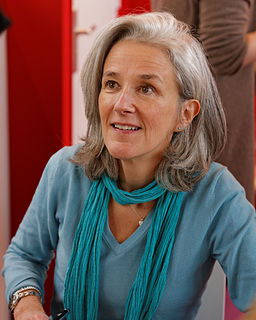A Quote by Kurt Vonnegut
She believed, and was entitled to believe, I must say, that all human beings were evil by nature, whether tormentors or victims, or idle standers-by. They could only create meaningless tragedies, she said, since they weren't nearly intelligent enough to accomplish all the good they were meant to do.
Related Quotes
The tears that kept Buttercup company the remainder of the day were not at all like those that had blinded her into the tree trunk. Those were noisy and hot; they pulsed. These were silent and steady and all they did was remind her that she wasn’t good enough. She was seventeen, and every male she’d ever known had crumbled at her feet and it meant nothing. The one time it really mattered, she wasn’t good enough.
Insofar as she recognized at all that she was dreaming, she realized that she must be exploring her subconscious mind. She had heard it said that humans are supposed only to use about a tenth of their brains, and that no one was really clear what the other nine tenths were for, but she had certainly never heard it suggested that they were used for storing penguins.
You must be mistaken," Isabel said, unconcerned by the insult that the words carried. "I assure you i am not. Voluptas is nearly always portrayed wrapped in roses. If that were not enough, her faces confirms her identity." "You cannot tell a goddess from a face carved in marble," she scoffed. "You can tell Voluptas by her face." "I've never even heard of this goddess, and you know what she looks like?" "She is the goddess of sensual pleasure." Isabel's mouth fell open at the words. She could not think of a single thing to say in response. "Oh
I asked a girl who came from America to England, when I was only English, and she admitted she had been to a drama school. And I said, "What did they teach you?" And she said, "They taught me to be a candle burning in an empty room." I'm happy to say she was laughing while she said it, but she meant it. I've never learned to be a candle burning in an empty room. So I go on the screen, and I say whatever I'm told to say.
If the universe were just electrons and selfish genes, meaningless tragedies ... are exactly what we should expect, along with equally meaningless good fortune. Such a universe would be neither evil nor good in intention ... The universe we observe has precisely the properties we should expect if there is, at bottom, no design, no purpose, no evil and no good, nothing but blind pitiless indifference.
They were close enough that he could feel the hurried beat of her heart. He could feel Charlotte's indecision in every word she didn't say and every move she didn't make. She was tense with uncertainty, quivering with irresolution. She might not be leaning into him, but she wasn't pulling away, either.
She'd always known he loved her, it had been the one certainty above all others that had never changed, but she had never said the words aloud and she had never meant them quite this way before. She had said it to him, and she hardly knew what she had meant. They were terrifying words, words to encompass a world.
My mother could never have said she loved fall, but as she walked down the steps with her suitcase in hand toward the red Monte Carlo her husband had been waiting in for nearly an hour, she could have said that she respected its place as a mediator between two extremes. Fall came and went, while winter was endured and summer was revered. Fall was the repose that made both possible and bearable, and now here she was was with her husband next to her, heading headlong into an early-fall afternoon with only the vaguest ideas of who they were becoming and what came next.
The girl wondered: These policemen... didn't they have families, too? Didn't they have children? Children they went home to? How could they treat children this way? Were they told to do so, or did they act this way naturally? Were they in fact machines, not human beings? She looked closely at them. They seemed of flesh and bone. They were men. She couldn't understand.
Jack believed in something—he believed in white witches and sleighs pulled by wolves, and in the world the trees obscured. He believed that there were better things in the woods. He believed in palaces of ice and hearts to match. Hazel had, too. Hazel had believed in woodsmen and magic shoes and swanskins and the easy magic of a compass. She had believed that because someone needing saving they were savable. She had believed in these things, but not anymore. And this is why she had to rescue Jack, even though he might not hear what she had to tell him.






































